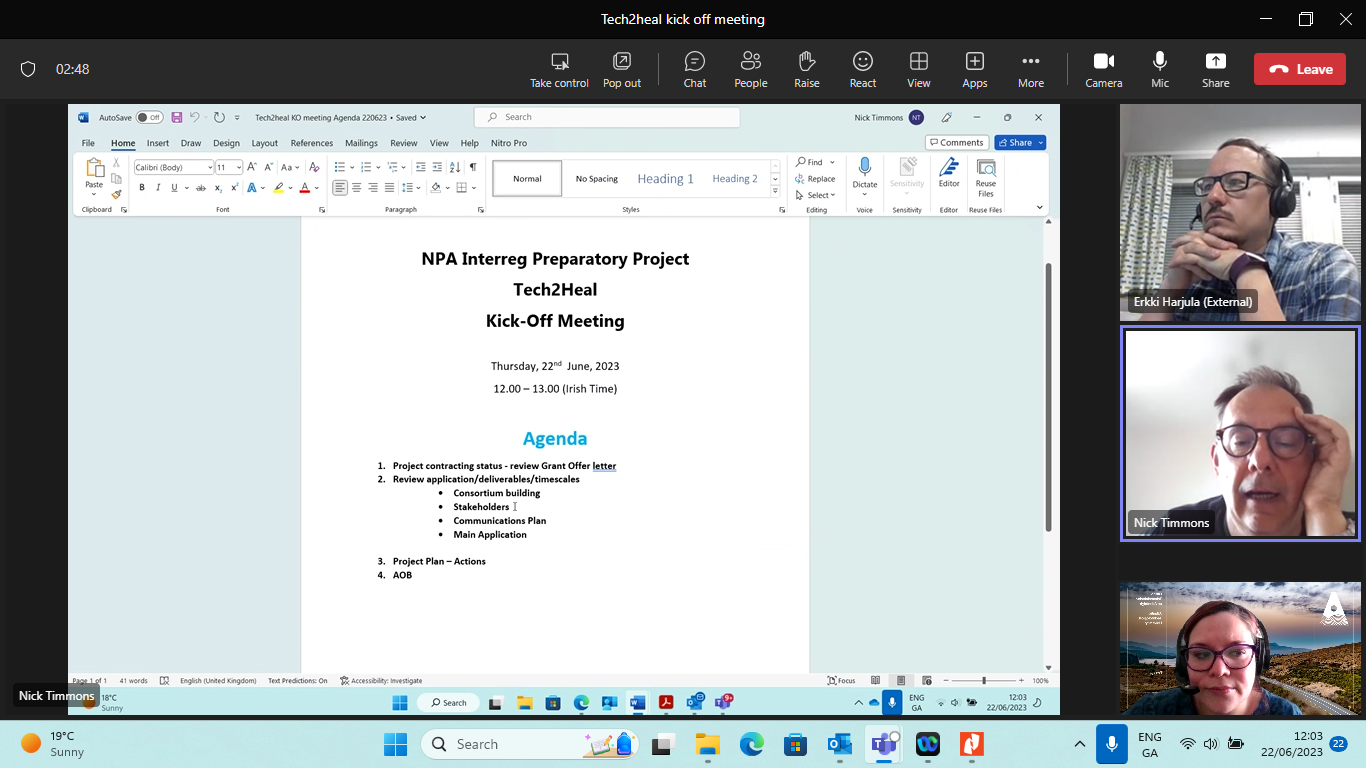Tech2Heal-Prep
Connected Technology to support the Health of the Working Population in Northern Remote Areas

What is Tech2Heal
Why do we need it in the NPA regions?
NPA countries are facing work absenteeism and early retirement owed to poor physical and mental health. Appropriate healthcare services in these sparsely populated regions that help people get back into work, such as occupational therapy/counselling, are currently under strain, difficult to access, expensive and underfunded.
Poor health in working older people with chronic diseases and inadequate healthcare leads to early retirement, resulting in fewer tax contributions, and strain on health and welfare services.
Tech2Heal will use a combination of qualitative/quantitative methods to fully understand the reasons behind these health related early retirements and absenteeism, including ubiquitous technology to monitor work-life balance.
Its ultimate goals are to help employees/self-employees to gain resilience and awareness to live healthier for longer; and propose suitable changes to work/health policies.
Objectives of the Tech2Heal preparatory project
The main objective of the project was to build a consortium and submit a main project proposal to NPA Interreg programme. This was achieved. To get to that point we had to carry out a feasibility study of the project concept, to ensure it was a viable idea, develop a communication strategy, build a suitable consortium of partners from across the NPA regions, and finally develop the main proposal with the new consortium.
A state-of-the-art review was carried out for both the Irish and Finnish working landscapes to examine the evidence for the health-related causes for increased absenteeism and early retirement among older workers, with the following objectives:
- identify the main problems in the working environment related to absenteeism and early retirement in the NPA countries, and key stakeholder groups who are the most affected and can benefit the most from this project.
- Organise and poll stakeholders regarding their life-work situation.
- Identify and review cases where technologies have been used to monitor the well-being of workers for preventive or reactive healthcare models.
The full State of the Art Review Report can be accessed here.
Summary of the conclusion
It was observed that absenteeism and early retirement related to illness result in detrimental consequences to employers, such as reduced productivity, not meeting deadlines, putting the reduced staff numbers under pressure, and financial loss.
Also, it was observed that the majority of the illness-related cases are linked to musculoskeletal problems or anxiety/depression. In addition, some sectors are at higher risk of work-related illness than others.
Working conditions and work-life balance are key to predicting work-related illness.
Ubiquitous technologies, such as wearables, have shown that they, if used ethically, can provide enhanced awareness to employees and employers regarding working conditions and work-life balance.
As part of the review stakeholder groups in Ireland and Finland were surveyed on their attitudes and readiness for digital monitoring technology as part of employer occupational health strategy. The results were broadly positive.
The feasibility study analysed the uptake of connected digital health technology to support proactive and preventive healthcare models for national health services. It also examined the trade-off between the two and how they can improve the health of older working people in northern areas. It examined why the uptake of connected health technologies has fallen short of predictions.
The key outcomes of this study guided the design of the main project. The main project was developed with the consortium and submitted to the NPA Interreg 4th Call in February 2024.
The objectives of the main project will be to influence the relevant EU healthcare professionals, policymakers, and health authorities to make the necessary changes to improve remote healthcare services; and to enable the working population to participate more in taking care of their own health, supported by an innovative digital connected health system.
Considering the shared healthcare challenges across the NPA region, this project will adopt digital technology-based solutions (Spec Obj 1.2) to enable enhanced healthcare services in the NPA region.

Project priority
 Innovation
Innovation
Project period
Start
01.06.2023End
30.11.2023Project info
Objective
1.2 Reaping the benefits of digitisation for citizens, companies, research organisations and public authorities
Total Budget
48.990,68 EUR
NPA Co-Financing
31.843,93 EUR
